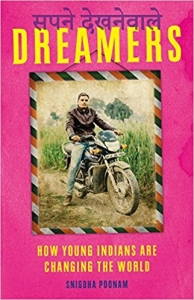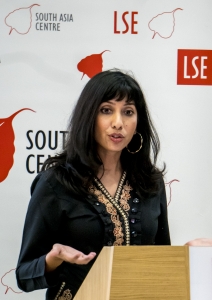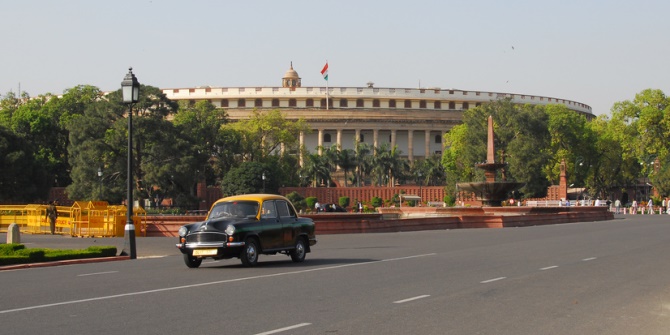
 LSE South Asia Centre recently invited Snigdha Poonam, journalist at Hindustan Times and author of Dreamers: How Young Indians are Changing the World, for a panel discussion entitled ‘Who are the Middle Class in South Asia?’ as part of the South Asia Summit 2018. In conversation with Anirbaan Banerjee, she talks about aggressive Indian nationalism, the political and economic frustrations of the middle-class young Indian, women’s aspirations and a growing social-political crisis in India. Edited excerpts:
LSE South Asia Centre recently invited Snigdha Poonam, journalist at Hindustan Times and author of Dreamers: How Young Indians are Changing the World, for a panel discussion entitled ‘Who are the Middle Class in South Asia?’ as part of the South Asia Summit 2018. In conversation with Anirbaan Banerjee, she talks about aggressive Indian nationalism, the political and economic frustrations of the middle-class young Indian, women’s aspirations and a growing social-political crisis in India. Edited excerpts:
Anirbaan Banerjee (AB): A paradox describes young middle class Indians today – they are extremely exposed to the world outside, but, at the same time, they seem to have an increasingly narrow definition of what they understand being Indian as. How do you see this playing out in the everyday lives of the people you have engaged with in your work?
Snigdha Poonam (SP): When you speak to these Indians about nationalism, they aren’t really speaking about ‘nation’ in any broad sense. I think the most I’ve learnt about how they see themselves in the country, and the country in the world, is by going through the question-and-answer forums on the internet. Most of these platforms have been completely hijacked by young Indians, and if you go through the questions and answers, there are just five or six things that keep repeating. They’ll keep comparing Indian and Chinese submarines, they’ll keep comparing India and America in terms of development, the size of the software industry. They will keep saying, ‘Oh, but so many people are poor in Pakistan whereas only so few are…’ But, if you keep digging deeper, in little pockets of this very anxious and aggressive network of young Indians, you will also find questions about India’s most basic future. You’ll see questions like, ‘Is India ever going to become a superpower?’ ‘Is India a developing country?’ Most recently, I saw questions which asked, ‘Is Narendra Modi ever going to fulfil his promises?’ So, I feel like a lot of that kind of aggressive nationalism is coming from this sense of deep insecurity about the place of these young Indians in India and about India’s place in the world.
AB: In your book, you talk about how a lot of these people consider the system to have failed. So, they try to find ways to work around the system. How do you think this Indian youth relates to its government and what kind of political expectations does it have from the government? What motivates it to vote?

SP: Again, I don’t think that these young people think about the big political questions that may concern you or me. When they think of the government, they sometimes think of jobs, but also in cases of desperation. Government jobs weren’t such a big deal when I was growing up. But, suddenly, they are completely back in fashion. Why? It is because private jobs are becoming harder to get, and paying poorly. No one wants to move to a city and survive on such a petty salary. The most basic expectation from the government is work, which is why we are seeing so many violent agitations around quotas. And these are communities – whether they are Patidars or Marathas or Jats – that traditionally voted BJP and did not demand anything in return. If you look at the Patels, they were powerful landowners and they kind of patronised BJP in Gujarat and did not demand anything as immediate as jobs. But, suddenly because of so many factors – the farms have split up, these young people don’t want to live in villages – they want something in return.
I saw some expectations around individual freedoms, but, only from people who found it harder to claim them – like the freedom to eat what they wanted to, the freedom to meet who they wanted to, to marry who they wanted to. These freedoms are more difficult to achieve for minorities, so, I felt this is the kind of disappointment and frustration that they feel towards the government.
AB: But do they still have a sense of faith with which they participate in these politics?
SP: Just before the 2014 elections, there was that mood. So, if you spoke to a young person in 2014 and you asked them, ‘What are your issues?’ they weren’t able to spell it out, but, you got a general sense of frustration with the previous regime. If you asked them why, they wouldn’t be able to tell you, because young people in India do not engage in politics at an internal level, even though we have this idea that Indians are very political. But, if you ask them what the issues are – and I do it before every election – they will not be able to spell it out. They’ll just say that Congress has looted this country, or Congress has failed this country. They did fall for Narendra Modi’s presentation or image-making. So, there was that mood, but I don’t see that sustaining.
AB: In your book, there is this idea of gender norms being reinforced, but also at the same time, in some ways being challenged. How do you see the experience of young women in India today who live in small towns?

SP: For a young woman, demanding change is very different from a young man demanding change. For young women, there are so many basic challenges to be met. They have to first ask their families to allow them to work, they have to struggle for equal pay, for safe work spaces. There are so many women who drop out of work because they can’t find safe transport as the streets don’t have enough lights. So, I think ambition plays out very differently. And if they are ambitious, they are mostly just thinking about their own goals, they are not thinking about how to make India the glory of the world’s civilisation, or how to bring down China, or how to defeat America.
AB: Where do you see this generation of young Indians going from here?
SP: I expect more and more breakdown of ethics, as we keep coming across in the book. I also feel like there are going to be more and more demonstrations of these frustrations. But, at the same time, because the Indian society is split up across so many divisions, you will never see a kind of nationwide youth revolt. Every day you have young people in one corner or the other – you saw the protests against the film Padmavat. There are just hundreds of millions of young Indians who feel frustrated with their lives. They just want absolutely any way to express themselves to the wider world. I don’t have great hope for the future and I really want the Indian government to take these frustrations seriously.
AB: How do you think the affluent urban Indians look at these young Indians? Do you think they are able to understand their situation?
SP: Not really. I do see a lot of disconnect in how these very small pockets of urban, affluent youngsters think of themselves, and in how these large numbers of young people in small towns and villages, who are not doing that well, see themselves. But, at the same time, I feel like the affluent urban young Indian is such a small category that I don’t see it as a defining influence for the future of the country. What worries me more is the aspirations and anxieties of these hundreds of millions of young people in small towns and villages.
Listen to the podcast of the event here.
Cover Image: Party flags of Bharatiya Janta Party (BJP) and Shiv Sena on display at an election rally in Mumbai. Credit: Al Jazeera / Flickr/ CC BY-SA 2.0
This article gives the views of the authors, and not the position of the South Asia @ LSE blog, nor of the London School of Economics. Please read our comments policy before posting.
About The Authors
 Snigdha Poonam is a journalist at The Hindustan Times, an English language newspaper in India, and is the author of Dreamers: How Young Indians are Changing the World (2018). Her work has appeared in The Guardian, The New York Times, Granta and The Financial Times. Her article ‘Lady Singham’s Mission Against Love” was runner-up in the Bodley Head/Financial Times Essay Prize, 2015. She tweets @snighdapoonam
Snigdha Poonam is a journalist at The Hindustan Times, an English language newspaper in India, and is the author of Dreamers: How Young Indians are Changing the World (2018). Her work has appeared in The Guardian, The New York Times, Granta and The Financial Times. Her article ‘Lady Singham’s Mission Against Love” was runner-up in the Bodley Head/Financial Times Essay Prize, 2015. She tweets @snighdapoonam
 Anirbaan Banerjee is pursuing an MSc in Sociology at the LSE. His research interests include post-colonial studies, social theory, cultural studies and immigrant cultures.
Anirbaan Banerjee is pursuing an MSc in Sociology at the LSE. His research interests include post-colonial studies, social theory, cultural studies and immigrant cultures.







